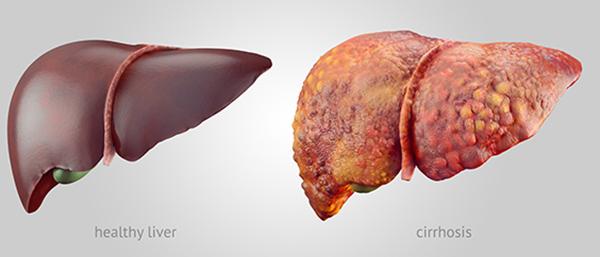Used as a noninvasive diagnostic tool, it might help patients with common nonalcoholic fatty liver disease avoid one of its deadly, progressive complications

Credit: National Institute of Diabetes and Digestive and Kidney Diseases
Nonalcoholic fatty liver disease (NAFLD) is the leading cause of chronic liver disease worldwide, affecting an estimated one-quarter of the global population. It is a progressive condition that, in worst cases, can lead to cirrhosis, liver cancer, liver failure and death.
In a new paper published online June 30, 2020 in Cell Metabolism, a team of scientists, led by researchers at University of California San Diego School of Medicine, report that stool microbiomes — the collection of microorganisms found in fecal matter and in the gastrointestinal tract — of NAFLD patients are distinct enough to potentially be used to accurately predict which persons with NAFLD are at greatest risk for having cirrhosis — the late-stage, irreversible scarring of the liver that often requires eventual organ transplantation.
“The findings represent the possibility of creating an accurate, stool microbiome-based, non-invasive test to identify patients at greatest risk for cirrhosis,” said senior author Rohit Loomba, MD, professor of medicine in the Division of Gastroenterology at UC San Diego School of Medicine and director of its NAFLD Research Center. “Such a diagnostic tool is urgently needed.”
Loomba said a novel aspect of the study is the external validation of gut microbiome signatures of cirrhosis in participant cohorts from China and Italy. “This is one of the first studies to show such a robust external validation of a gut microbiome-based signature across ethnicities and geographically distinct cohorts.
The work builds upon previous published research in 2017 and 2019 by Loomba and colleagues.
A link between NAFLD and the gut microbiome is well-documented, but specifics were scant and it has not been clear that discrete metagenomics and metabolomics signatures might be used to detect and predict cirrhosis. In the latest study, researchers compared the stool microbiomes of 163 participants encompassing patients with NAFLD-cirrhosis, their first-degree relatives and control-patients without NAFLD.
Combining metagenomics signatures with participants’ ages and serum albumin (an abundant blood protein produced in the liver) levels, the scientists were able to accurately distinguish cirrhosis in participants differing by cause of disease and geography.
The next step, said Loomba, is to establish causality of these gut microbial species or their metabolites in causing cirrhosis, and whether this test can be used and scaled up for clinical use.
###
Co-authors include: Tae Gyu Oh, Ting Fu, Ruth T. Yu, Annette R. Atkins and Michael Downes, Salk Institute for Biological Studies; Susy M. Kim, Shirin Bassirian, Seema Singh, Egbert V. Madamba, Lisa Richards, Ricki Bettencourt, Pieter Dorrestein, David A. Brenner, Claude B. Sirlin, and Rob Knight, UC San Diego; Cyrielle Caussy, UC San Diego and University of Lyon, France; Jian Guo and Tao Huan, University of British Columbia, Vancouver; Manuela Raffatellu, UC San Diego and Chiba University-UC San Diego Center for Mucosal Immunity, Allergy and Vaccines; and Ronald M. Evans, Salk Institute for Biological Sciences, and Howard Hughes Medical Institute.
Media Contact
Scott LaFee
[email protected]
Related Journal Article
http://dx.




